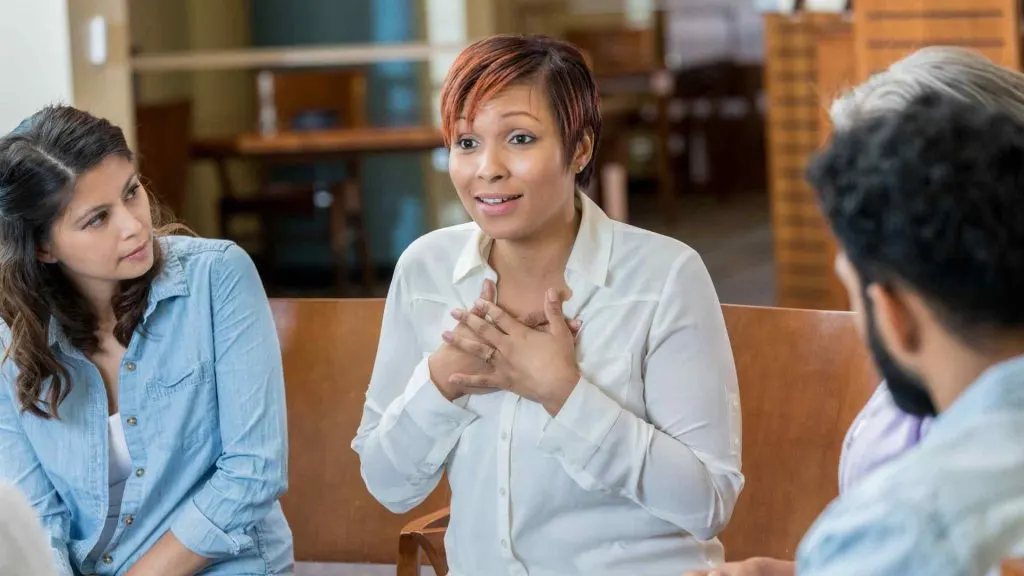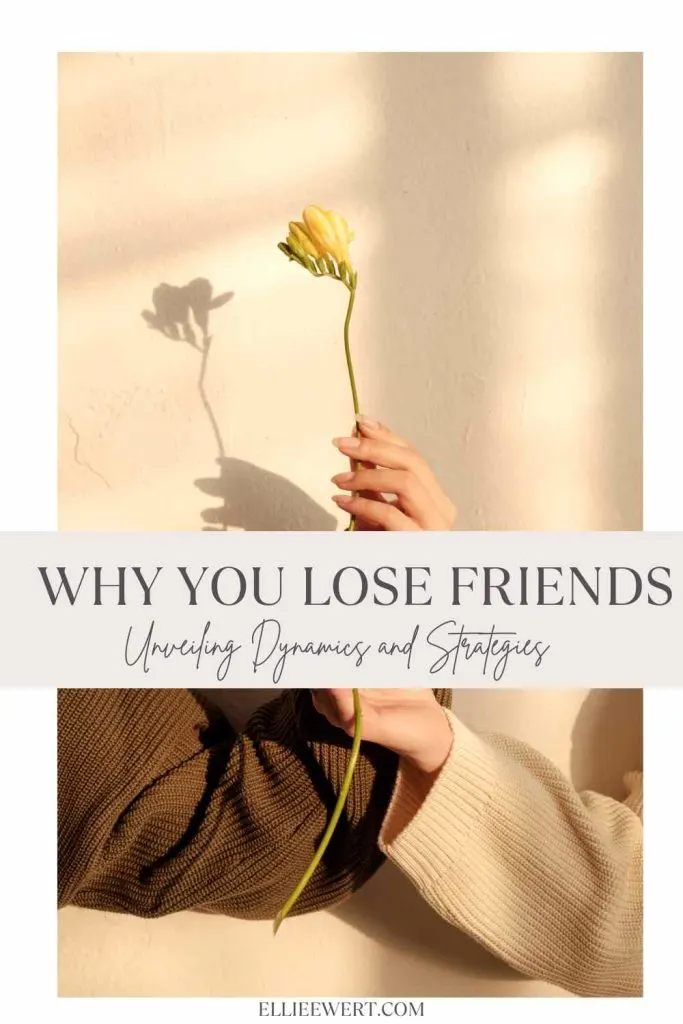Friendship dynamics can be complex, but understanding the underlying factors can make a significant difference in nurturing lasting connections.
Join us as we explore the common pitfalls that lead to losing friends and discover practical strategies for fostering meaningful and enduring relationships.

Unveiling Reasons for Friendship Loss
One-Sided Support
One-sided emotional support is a common reason for losing friends. When one person consistently leans on the other for support without reciprocating, it can strain the relationship.
The imbalance creates resentment and frustration, leading to a gradual drift apart.
Constant inconvenience also plays a role in this pattern. If a friend always expects favors without offering anything in return, it can create feelings of being taken advantage of.
This often leads to the breakdown of the friendship over time.
Differing Opinions
In today’s political climate, differing opinions can significantly impact friendships. With polarizing views on social and political issues, disagreements can become heated and personal.
This can strain even the strongest of friendships as individuals struggle to find common ground.
Moreover, when friends hold opposing beliefs on sensitive topics such as religion, race, or social justice, it can lead to conflicts that are challenging to navigate. These differences can cause rifts that ultimately result in the loss of friendship.
Personal Experiences and Psychological Disorders
Personal experiences and psychological disorders can also affect friendships.
For instance, someone dealing with anxiety or depression may find it challenging to maintain relationships due to their mental health struggles. This can lead to feelings of isolation and difficulty in connecting with others.
Similarly, traumatic experiences such as loss or abuse can alter an individual’s behavior and ability to trust others. These experiences may lead to difficulties in maintaining healthy friendships as trust issues surface.

Dynamics Behind Friendship Changes
Imbalances in Friendships
Feelings of imbalance can arise when one friend consistently takes more than they give. This can lead to resentment and a sense of unfairness, causing the relationship to strain.
When one friend constantly leans on the other for support without reciprocating, it creates a lopsided dynamic that often leads to drifting apart.
One friend feeling like they are always the giver while receiving little in return can create a sense of frustration and disappointment. Over time, this can erode the foundation of the friendship, causing it to weaken and eventually dissolve.
Diverging Life Paths
As individuals grow and develop, their feelings and priorities may change, leading them down different paths.
This can impact friendships as people may find themselves with less in common than before. For example, one friend might prioritize career advancement while the other focuses on starting a family.
These diverging life paths can result in decreased time spent together and fewer shared experiences. As a result, the bond between friends weakens as they no longer have as much in common or are unable to relate to each other’s current life situations.
Differing World Views
Differing feelings about important issues such as politics, religion, or personal values can strain relationships.
When friends hold conflicting beliefs or opinions, it can lead to tension and conflict. These differences can cause discomfort during conversations or interactions, making it challenging for friends to maintain a close connection.
For instance, if one friend holds strong political views that clash with those of the other friend, it can create an emotional barrier between them. This divide in perspectives can make it difficult for friends to engage in meaningful discussions without causing friction.
Recognizing Self-Centered Behaviors
Lack of Reciprocity
Sometimes, lack of reciprocity can lead to the erosion of friendships. When one friend is always the listener and supporter without receiving the same in return, it creates an imbalance. This can make the relationship feel one-sided and eventually strain the bond.
Selfishness in Actions
Selfish actions such as constantly steering conversations back to oneself or always prioritizing personal needs over the friend’s can create distance. Friends may start feeling unvalued or insignificant when their needs are consistently overlooked.
Ignoring Boundaries
Ignoring boundaries is another self-centered behavior that can drive friends away. It’s crucial to respect each other’s personal space, emotions, and time. Constantly overstepping these boundaries can cause discomfort and resentment in friendships.
Impact on Friendships
These self-centered behaviors can have a detrimental impact on friendships. They can lead to feelings of neglect, frustration, and even resentment from the other party. Over time, this emotional strain can result in a gradual drift or a sudden end to the friendship.
Role of Personal Growth
Recognizing these self-centered tendencies is the first step towards personal growth. By acknowledging these behaviors, individuals can take proactive steps to change them. Engaging in self-reflection and seeking feedback from others can aid in identifying areas that need improvement.
Cultivating Empathy
Cultivating empathy is essential for overcoming self-centered tendencies. It involves actively listening to others, considering their perspectives, and showing genuine care for their well-being. With increased empathy, individuals become more attuned to their friends’ needs and emotions.
Practicing Gratitude
Practicing gratitude helps shift the focus from oneself to appreciating others. Expressing gratitude for friends’ support and companionship fosters a deeper sense of connection. It also encourages a more balanced approach to nurturing friendships.

Managing Friendship and Time
Balancing Commitments
Finding the right balance between maintaining friendships and managing other life commitments is crucial. Many individuals struggle to allocate time for their friends due to busy schedules. It’s essential to recognize that everyone has limited time each day, and it’s important to prioritize activities based on their significance.
Implementing Time Management Techniques
To nurture friendships effectively, individuals can implement various time management techniques. Setting aside specific times during the day or week for social interactions can be beneficial.
This allows individuals to dedicate focused attention to their friends without feeling overwhelmed by competing priorities. Utilizing tools such as calendars or scheduling apps can help in organizing social gatherings and maintaining regular communication with friends.
Prioritizing Quality Over Quantity
In today’s fast-paced world, it’s common for individuals to have numerous acquaintances but few close friends.
Prioritizing quality over quantity in friendships can lead to more meaningful and fulfilling connections.
Instead of spreading oneself too thin by trying to maintain a large social circle, focusing on nurturing a few deep and meaningful friendships can be more rewarding.
Making Time for Meaningful Interactions
When it comes to spending time with friends, it’s not just about the quantity of time spent together; rather, it’s the quality of interactions that matter most.
Engaging in activities that foster genuine connections and emotional bonding can strengthen friendships.
Whether it’s having heart-to-heart conversations, participating in shared hobbies, or simply being present during challenging times, these moments contribute significantly to the depth of a friendship.
Embracing Flexibility
Flexibility is key when managing friendships alongside other commitments. Being adaptable and understanding towards friends’ schedules and priorities fosters a supportive environment within the friendship.
It’s important to acknowledge that everyone faces challenges in balancing different aspects of life, and showing empathy towards each other’s situations strengthens the bond between friends.
Challenges of Distance
Maintaining friendships over long distances can be challenging. Distance often leads to a lack of physical presence, making it difficult to stay connected.
Without regular face-to-face interaction, it’s easy for friendships to drift apart.
Rekindling Fading Friendships
To rekindle fading friendships, it’s important to find ways to bridge the gap. Making an effort to reach out through phone calls, video chats, or even handwritten letters can help maintain the connection. Sharing experiences from the past and reminiscing about shared memories can reignite the bond.
Importance of Communication
Communication is key in maintaining distant friendships. Regularly checking in with friends, sharing updates about your life, and expressing genuine interest in their well-being are crucial steps.
It’s essential to actively listen and show empathy towards their views and feelings, even if you may not physically be there for them.

Initiating Honest Conversations
Open Communication
Initiating honest conversations is crucial in addressing friendship issues. Open communication allows both parties to express their thoughts, concerns, and feelings openly. It creates a platform for discussing any underlying issues that may be affecting the friendship.
Engaging in open communication involves expressing oneself clearly and actively listening to the other person. It’s important to create an environment where both individuals feel comfortable sharing their perspectives without fear of judgment or reprisal.
Resolving Conflicts
When conflicts arise in friendships, initiating honest conversations can lead to resolution.
Addressing conflicts through open and honest discussions helps in understanding each other’s viewpoints and finding common ground. By acknowledging the differences and seeking solutions together, friends can strengthen their bond.
It’s essential to approach conflict resolution with empathy and understanding. This involves considering the other person’s feelings and perspectives while also expressing one’s own emotions constructively. Through this process, friends can work towards resolving conflicts amicably.
Creating a Safe Space
Creating a safe space for discussing feelings and concerns within friendships fosters trust and understanding.
Establishing a safe environment encourages friends to share their thoughts without hesitation or fear of repercussions. This safe space allows for vulnerability and authenticity in conversations.
In a safe space, friends can openly express their emotions, fears, and insecurities without feeling vulnerable or judged. It enables them to support each other through challenging times and celebrate successes together. This nurturing environment strengthens the emotional connection between friends.
Practicing Empathy and Gratitude
Cultivating Empathy
Cultivating empathy involves actively listening to your friends and trying to understand their perspective. It’s about putting yourself in their shoes and acknowledging their emotions without judgment.
By doing so, you can strengthen your bond with them and create a deeper sense of understanding.
Empathy also involves being present for your friends during challenging times. For instance, if a friend is going through a tough situation, offering emotional support and showing genuine concern can make a significant difference. This kind of support helps build trust and fosters stronger connections.
Expressing Gratitude
Expressing gratitude for the positive aspects of friendships is essential for maintaining those relationships.
Take the time to reflect on the positive memories and experiences you’ve shared with your friends. Consider writing down these memories as a way to acknowledge and appreciate the value they bring to your life.
When expressing gratitude, it’s important to be specific about what you appreciate in your friends.
Whether it’s their sense of humor, their unwavering support, or their honesty, letting them know how much you value these qualities can strengthen the friendship. Small gestures of appreciation can go a long way in nurturing lasting bonds.
Strengthening Bonds Through Active Listening
Strengthening bonds with friends involves active listening and providing emotional support when needed.
When engaging in conversations with friends, make an effort to truly listen to what they’re saying without interrupting or formulating responses in your mind. This demonstrates that you value their thoughts and feelings.
Moreover, offering emotional support means being there for your friends during both joyful moments and challenging times.
Being present during celebrations or offering a shoulder to lean on during difficult periods shows that you are invested in the friendship. Your consistent effort to provide emotional support will help solidify the bond between you and your friends.

Embracing Personal Growth in Friendships
Self-Reflection
When it comes to friendships, self-reflection plays a crucial role in personal growth.
Taking the time to assess our own actions and behaviors allows us to understand how they impact our relationships with others. By acknowledging our strengths and weaknesses, we can actively work on becoming better friends.
Self-reflection also enables us to recognize patterns in our interactions with others. It helps us identify areas where we may need improvement, such as communication skills or handling conflicts.
This heightened self-awareness can lead to more meaningful and fulfilling friendships, as we become more attuned to the needs of our friends.
Pursuing Emotional Intelligence
Pursuing emotional intelligence is essential for fostering healthy and lasting friendships.
Understanding and managing our own emotions, as well as being empathetic towards the feelings of others, forms the foundation of emotional intelligence. By honing these skills, we can navigate through various social situations with greater ease.
Developing emotional intelligence involves active listening, showing empathy, and being mindful of how our words and actions affect those around us. T
hese qualities contribute to building trust and deeper connections with our friends. As a result, good times are cherished even more, leading to stronger bonds that withstand the test of time.
Engaging in Self-Improvement Activities
Engaging in activities that promote self-improvement can have a positive impact on friendships. Whether it’s pursuing a new hobby, attending workshops on personal development, or seeking therapy for self-growth, these endeavors can significantly enhance our ability to connect with others.
By continuously striving to better ourselves, we become more open-minded, adaptable, and understanding in our interactions with friends.
This not only enriches our own lives but also creates an environment where support and encouragement thrive among friends. Sharing these experiences with others can bring about a sense of fulfillment and mutual growth within the friendship circle.
Cultivating Meaningful Relationships
Cultivating meaningful relationships requires effort from all parties involved. It involves being present for each other during both joyful moments and challenging times.
When everyone involved is committed to personal growth, friendships evolve into powerful sources of strength and joy.

Strategies for Cherishing Lifelong Connections
Cultivating Trust
Building trust is essential in maintaining lifelong friendships.
Consistently being honest and reliable fosters a deep sense of trust. Sharing personal experiences and vulnerabilities can also strengthen the bond, creating an environment of openness and authenticity.
Establishing boundaries is equally important. Respecting each other’s boundaries ensures that both parties feel comfortable and valued within the friendship. Moreover, being dependable during challenging times further solidifies the foundation of trust.
Nurturing Mutual Respect
Mutual respect forms the cornerstone of enduring friendships. Listening actively to each other’s opinions and perspectives demonstrates respect.
It’s crucial to acknowledge each other’s feelings and validate their experiences, fostering a supportive atmosphere.
Moreover, showing appreciation for each other’s accomplishments and efforts is vital in nurturing mutual respect. Celebrating milestones together reinforces the value placed on each other, strengthening the bond.
Creating lasting memories with friends is instrumental in cherishing lifelong connections. Engaging in shared activities or traditions creates a sense of belonging and unity.
Revisiting fond memories from the past evokes nostalgia and strengthens the emotional connection between friends.
Celebrating significant milestones together, such as birthdays or anniversaries of friendship, further cements the bond. These celebrations serve as reminders of the enduring nature of the friendship, reinforcing its significance.
Fostering Loyalty
Loyalty plays a pivotal role in maintaining lifelong friendships. Being there for each other during both joyous occasions and hardships demonstrates unwavering loyalty.
Offering support without judgment or conditions reinforces the depth of the friendship.
Honoring commitments and promises contributes to fostering loyalty within the relationship. Consistently showing up for each other builds a strong sense of reliability and commitment.
Closing Thoughts
Understanding the complexities of friendship dynamics can be challenging, but recognizing the reasons behind losing friends is the first step towards fostering healthier and more fulfilling connections.
By acknowledging self-centered behaviors, managing time effectively, and initiating honest conversations, you can navigate through friendship changes with empathy and gratitude.
Embracing personal growth within your friendships and cherishing lifelong connections will not only enrich your social life but also contribute to your overall well-being.
Take a moment to reflect on your own friendships and consider how you can apply the strategies discussed. Remember, it’s never too late to mend strained relationships or cultivate new ones.
By prioritizing empathy, gratitude, and personal growth in your friendships, you can create a supportive network that adds immense value to your life.
FAQs on Why You Keep Losing Friends
Why do friendships change over time?
Friendships can change due to various reasons such as evolving interests, different life paths, or shifting priorities. It’s natural for people to grow and change, which can impact the dynamics of friendships. Understanding and accepting these changes is essential for maintaining healthy relationships.
How can self-centered behaviors affect friendships?
Self-centered behaviors, such as constantly talking about oneself or not showing interest in others, can strain friendships. It’s important to practice empathy and actively listen to friends’ experiences and feelings. Building a balanced relationship based on mutual respect and understanding is crucial for sustaining friendships.
What are some effective strategies for managing friendship and time?
Effective time management involves prioritizing meaningful connections and setting aside dedicated time for friends. Communicating openly about schedules and commitments can help in balancing personal time with social interactions. Being mindful of how time is spent and making efforts to stay connected contribute to nurturing lasting friendships.
Open, honest conversations play a key role in navigating distant friendships. Expressing concerns about the drifting relationship while being empathetic towards the other person’s perspective is important. Finding common ground and making an effort to reconnect through shared activities or meaningful conversations can help bridge the gap.
What role does personal growth play in maintaining friendships?
Personal growth positively impacts friendships by fostering self-awareness, emotional maturity, and empathy. Engaging in self-improvement activities allows individuals to bring positive energy into their relationships, communicate effectively, and understand their friends’ perspectives better. Embracing personal growth contributes to creating deeper, more meaningful connections with friends.
How can one cherish lifelong connections with friends?
Cherishing lifelong connections involves consistent communication, celebrating milestones together, and offering support during challenging times. Making an effort to stay involved in each other’s lives, expressing gratitude for the friendship, and creating new memories together helps strengthen the bond over time. Prioritizing the relationship fosters enduring connections with friends.


